6 ‘Diet’ Foods Sabotaging Your Weight-Loss Goals

When you search the internet for weight-loss tips, you will likely come across a few common suggestions. These often include cutting calories, boosting your protein intake, eating more vegetables, and limiting your carb intake. As you put these suggestions into practice, you may also come across so-called “diet foods” that claim to meet your cravings with fewer calories, sugar, and fat. At first glance, it may feel like you’ve won the jackpot of nutritious and delicious food, but many of these diet foods may actually be sabotaging your weight-loss efforts.
While marketed as foods and drinks that aid in weight loss, many diet options make it more challenging to lose weight for a variety of reasons. Some contain ingredients that appear to increase appetite and cravings, while others may be so void of nutrients that you end up over-eating to feel satiated. Just because a product has fewer calories than similar foods and drinks doesn’t mean it is automatically a healthy food or ideal for weight loss. Read on to learn more about six diet foods that are making it harder to lose weight.
Unhealthy Diet Foods Hurting Your Weight-Loss Efforts:
- Diet Drinks
- Low-Fat Yogurt
- Veggie Chips
- Protein Bars
- Low-Fat Peanut Butter
- Pre-Made Smoothies and Shakes
Diet Drinks
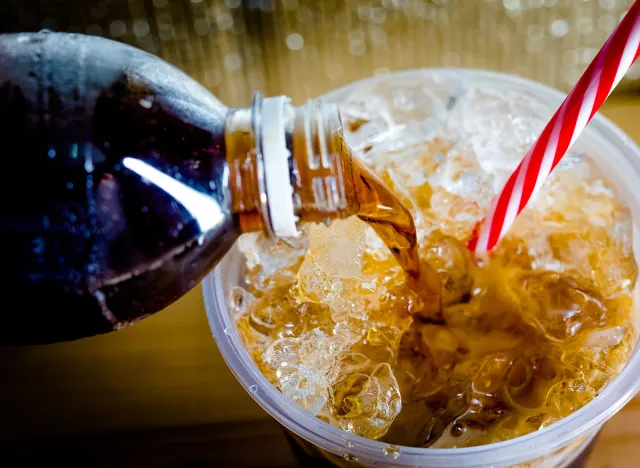
Regular soda and juice are loaded with sugar and can pack nearly 200 calories in a single-serve container. So, diet drinks that contain zero calories may seem like a good choice for weight loss, but in reality, they may have the opposite effect. That’s because of the zero-calorie sweeteners used to sweeten these drinks.
In fact, one study noted increased activity in the brain regions that are responsible for food cravings and appetite after consuming sucralose (which you may see under the brand name Splenda). So even though you’re not consuming calories or added sugar when you drink a diet soda, your body reacts as if you are, leaving you hungry and craving more sugar.
Whether you see sucralose or Splenda in the ingredient list of your favorite diet drink, think again before taking a sip. Healthy sodas made with stevia are great alternatives to traditional diet sodas.
Low-Fat Yogurt
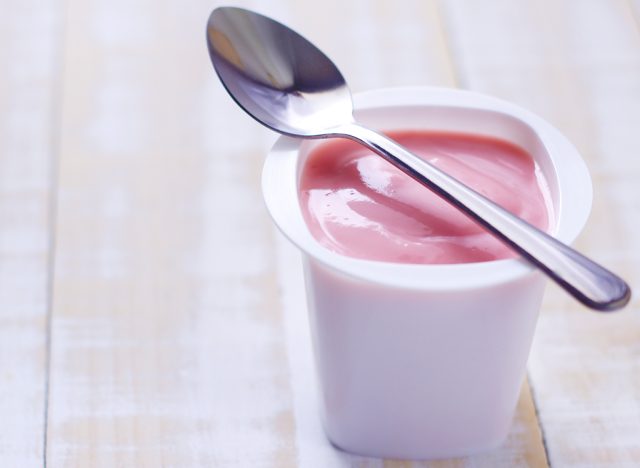
In the ’90s, a surge of manufactured low-fat products hit the shelves. You could find low-fat cookies, ice cream, chips, and more. One of the most popular items to emerge was low-fat yogurt. Although removing most of the natural fat from yogurt makes it a lower-calorie option, many manufacturers add sugar to the yogurt to compensate for the flavor lost by reducing the fat content.
Even with added sugar, low-fat flavored yogurt may result in a lower-calorie option than full-fat yogurt; however, the added sugar may slow weight loss. Research has noted a positive association between increased added sugar intake and weight gain. Other low-fat yogurts may be sweetened with sucralose instead of sugar, causing its own weight loss challenges.
Instead, choose plain yogurt and add natural sweetness from fruit or honey. If you prefer a sweetened yogurt, choose an option with less than 5 grams of added sugar or one sweetened with stevia.
Veggie Chips
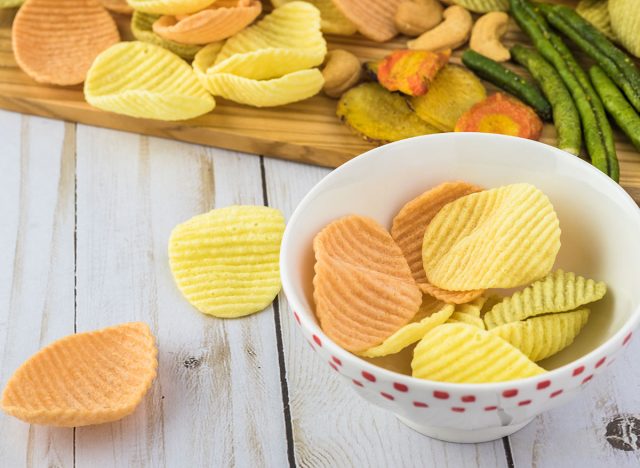
These popular chips—often with faint green, red, and orange hues—have gained popularity as a healthier alternative to regular chips. While they may provide fewer calories per serving compared to traditional chips, they may not satisfy your craving as well. That could lead to overeating as you look for satisfaction from your food, resulting in a high calorie intake.
Additionally, veggie chips and other low-fat options are not as filling as regular chips because they have few fat grams. Although veggie chips and similar products aren’t inherently unhealthy, it may be best to have a single serving of the real deal when you’re craving something salty. For healthier chips for weight loss, look for options with at least 1 gram of fiber per serving, and portion out your serving instead of eating straight from the bag to lessen your chances of overeating.
Protein Bars
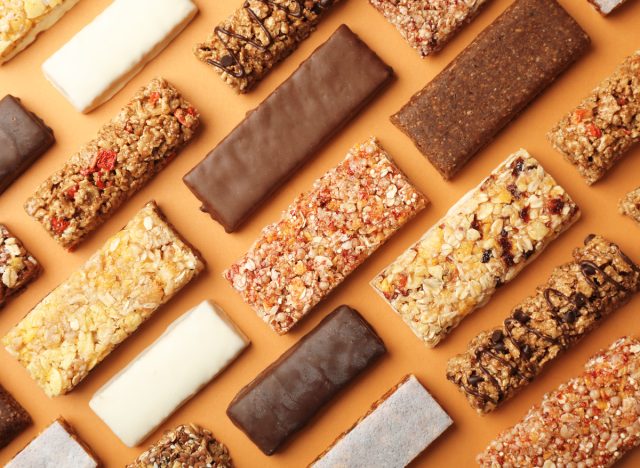
Sometimes marketed as a convenient meal replacement, protein bars may also be a source of hidden sugar and a surprisingly high-calorie count. It may be true that protein bars can serve as a convenient meal or snack, but replacing whole-ingredient foods with a processed bar may not be the best option for weight loss. Packing a meal’s worth of calories into a food that requires only a few bites can be far less satisfying than a small meal that includes a variety of flavors and textures and a larger volume of food. That is in addition to the added sugar and low fiber content often seen with protein bars.
If you like the convenience of protein bars, look for options that support weight loss with fewer than 200 calories and minimal added sugar. Pair them with a fruit or vegetable to incorporate more filling fiber into your meal or snack.
Low-Fat Peanut Butter
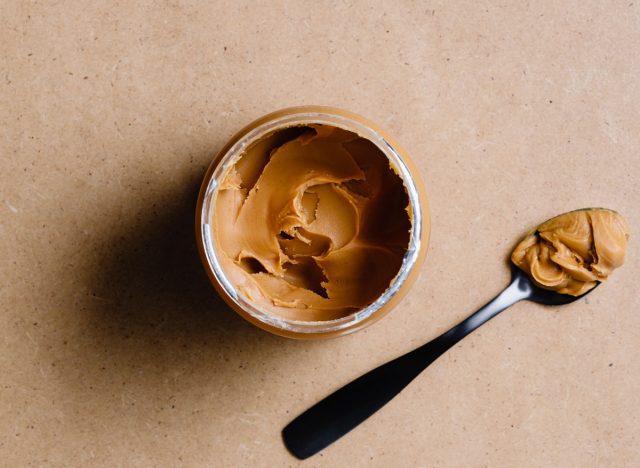
This superfood is loaded with protein and healthy fats but has received a bad rap over the years for being “fattening.” Because of this, manufacturers started making low-fat peanut butter to appeal to those trying to lose weight. However, there is only a difference of a few calories between low-fat and regular peanut butter. That’s because low-fat options often have more added sugar to compensate for the flavor loss.
This is another case where you are better off having the real deal. Look for healthy nut butters without added sugar and monitor your portion to make it work in your weight-loss diet.
Pre-Made Smoothies and Shakes
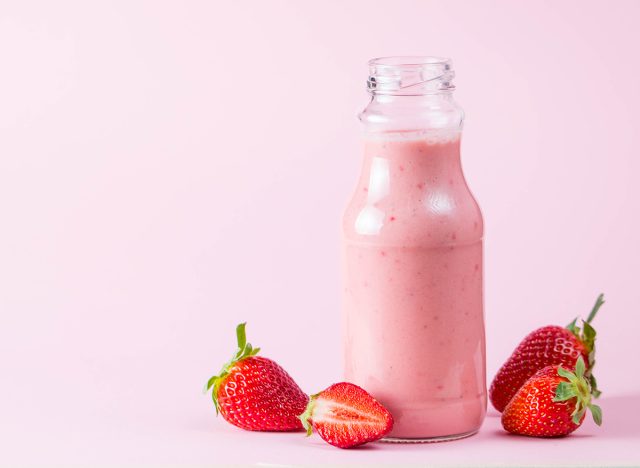
Packaged smoothies and shakes may provide a reasonable number of calories, but the balance of their nutrients may make weight loss more challenging. This is especially true for options containing added sugar and minimal protein, fat, and fiber. The sugar content (associated with weight gain) combined with a lack of filling nutrients in these smoothies can make it harder to lose weight.
Luckily, balanced, pre-made smoothies are available that can aid in your weight loss journey. Look for options with at least 15 grams of protein per serving and fewer than 5 grams of added sugar. Even better, options that contain fiber promote satiety and allow you to feel fuller.
Why Trust Eat This, Not That!?
Eat This, Not That! is committed to creating high-quality content that you can trust to be accurate, properly researched, routinely reviewed, and updated with the latest information. Our writers, editors, and medical and/or certified experts consider this to be an unwavering promise we make to our readers in the pursuit of delivering impactful and meaningful content.
- Source: https://jamanetwork.com/journals/jamanetworkopen/fullarticle/2784545?utm_source=For_The_Media&utm_medium=referral&utm_campaign=ftm_links&utm_term=092821#google_vignette
- Source: https://pmc.ncbi.nlm.nih.gov/articles/PMC6959843/#:~:text=Findings%20from%20large%20cross%2Dsectional,et%20al.%2C%202006%5D.